12 Unhealthiest Jams And Jellies You Can Buy

Whether they're paired with peanut butter, layered onto cake, or spooned onto your morning yogurt, jams and jellies add a fruity twist to any meal. At the same time, they're not always quite as fruity as you'd expect. A huge number of the go-to brands stocked on grocery store shelves are richer in corn syrup and additives than actual fruit -- in turn dragging down each product's nutritional value.
Of course, by their very nature, all jams and jellies are sweet. Jam is made using fruits such as strawberries, cherries, grapes, and raspberries, while jelly uses fruit juice -- both of which are naturally rich in sugar. Jam also contains sugar for practical reasons, too. The average jar is about 60% sugar, which is the sweet spot (no pun intended) to act as a natural preservative and prevent the growth of mold and microorganisms.
The products that combine these necessary sugars with OTT amounts of added sugars -- and take up a huge chunk of the daily amount recommended by the FDA (50 grams) -- are the ones that are cause for concern. If you're looking to make healthier choices with your next grocery shop, we've combed through the worst of the worst to find the jams and jellies you'll want to avoid.
Read more: Trader Joe's Frozen Desserts Ranked Worst To Best
1. Great Value Concord Grape Jelly
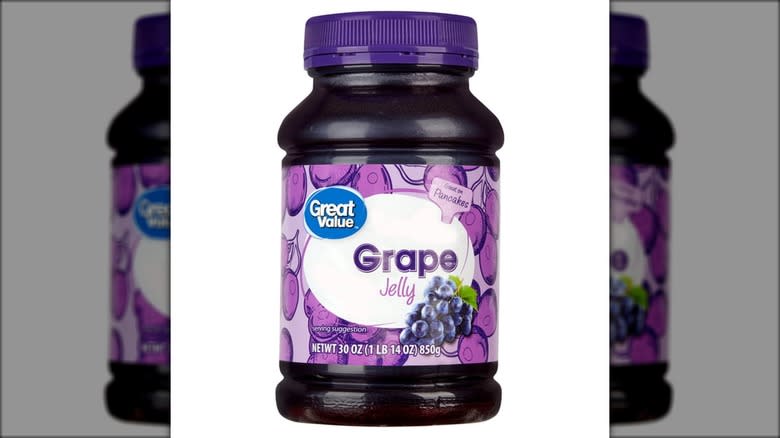
Like every product featured in Walmart's Great Value range, this jelly offers maximum flavor on a minimal budget. An 850-gram jar of Great Value Grape Jelly costs just $2.78, making it one of the most affordable options on this list. It also ranked highly on Mashed's breakdown of the tastiest grape jellies on the market, which is yet another point in its favor.
Where it's not so impressive is its ingredients. The jelly's nine grams of added sugars per tablespoon come courtesy of corn syrup and high-fructose corn syrup, both of which are typically used because they're cheaper than sugar (hence the affordability of this jelly). It's high-fructose corn syrup that raises the biggest red flag. Regular intake of this liquid sugar has been linked to a range of health issues, from an increased risk of fatty liver disease to diabetes. Experts have found that corn syrup poses similar risks, as well as potentially causing our appetites to increase.
Like lots of jams and jellies, the Great Value Grape Jelly also uses pectin. This is a soluble fiber that is naturally found in plenty of fruits and, in this context, is typically used as a thickener that can have a negative effect on some people's digestive systems, causing symptoms such as gas, bloating, and abdominal discomfort.
2. Smucker's Squeeze Grape Jelly
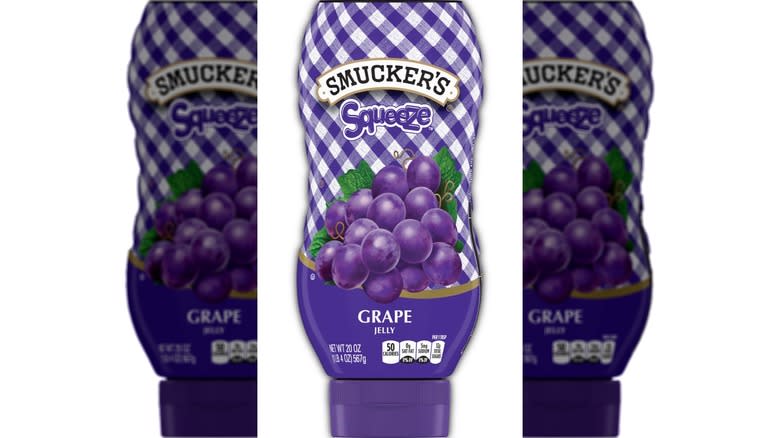
Smucker's Squeeze pairs great taste with convenience to create the ultimate on-the-go PB&J tool. Thanks to its squeezy bottle, you can slather copious amounts of grape goodness onto salty peanut butter with minimal effort (and minimal mess). Amazing though this culinary innovation of a childhood classic may be, it disappoints on the nutritional front, thanks largely to its high sugar content.
A single tablespoon of Smucker's Squeeze Grape Jelly contains a whopping 12 grams of sugar. Within these 12 grams, you'll find nine grams of added sugars, aka 12% of your daily recommended intake. Again, these added sugars come in the form of high-fructose corn syrup and corn syrup, both of which are listed directly after grape juice on the ingredients list. Smucker's has made efforts to remove high-fructose corn syrup from some products in recent years -- including its Uncrustables sandwiches -- but it's still a mainstay in the majority of its jams, jellies, and preserves. Pectin pops up again here, too.
3. Trader Joe's Pumpkin Spread
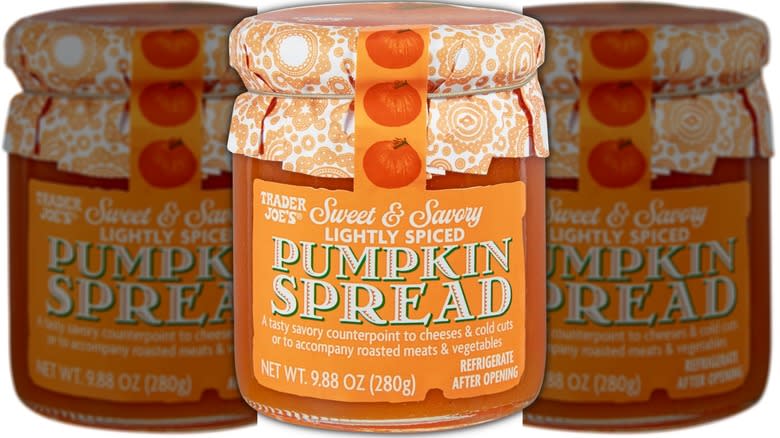
Come fall, Trader Joe's is a pumpkin spice lover's paradise. The chain offers a wide variety of creative pumpkin products every year, including Pumpkin Spice Hummus (yes, really), Pumpkin Overnight Oats, and the ever-divisive Spiced Pumpkin Goat Cheese. Pumpkin Spread has the honor of being one of its few year-long pumpkin staples, combining five simple ingredients -- pumpkin, cane sugar, pectin, lemon juice, and ground cinnamon -- to create a sweet and savory jam that pairs well with the likes of goat cheese, cold cuts, or a simple bagel, no matter the season.
As you can tell from the ingredients list, the Trader Joe's Pumpkin Spread doesn't contain high-fructose corn syrup, which is a plus. It does, however, rely pretty heavily on that cane sugar. This tallies up to a total of 12 grams of added sugar per tablespoon, which is nearly a quarter of the maximum amount you're supposed to eat in an entire day. That doesn't mean you can't eat it as an occasional treat, but you probably won't want to make it a daily occurrence.
4. Sam's Choice Strawberry And Rhubarb Preserves
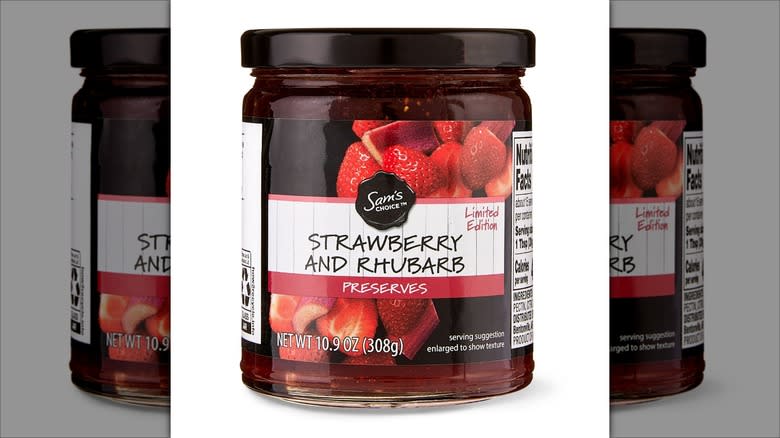
The big difference between regular jam and preserves is the fact that jam contains crushed fruit, while preserves contain whole or large pieces. Theoretically, that makes preserves higher in fiber than your average jam. That's certainly not the case for the Sam's Choice Strawberry and Rhubarb Preserves, which contain an incredible total of 0 grams of dietary fiber.
What it does contain is plenty of sugar. A single tablespoon serving of these preserves contains 10 grams of sugar, all of which are added sugars. That's 20% of your daily recommended intake, gone in a single spoonful. This extra-large helping of sugar should come as no surprise considering the fact that sugar is listed above both strawberry and rhubarb in the ingredients list, which is alarming considering that ingredients are listed in order of quantity. It does have one redeeming factor, though: it doesn't contain any high-fructose corn syrup.
5. Bonne Maman Muscat Grape Jelly
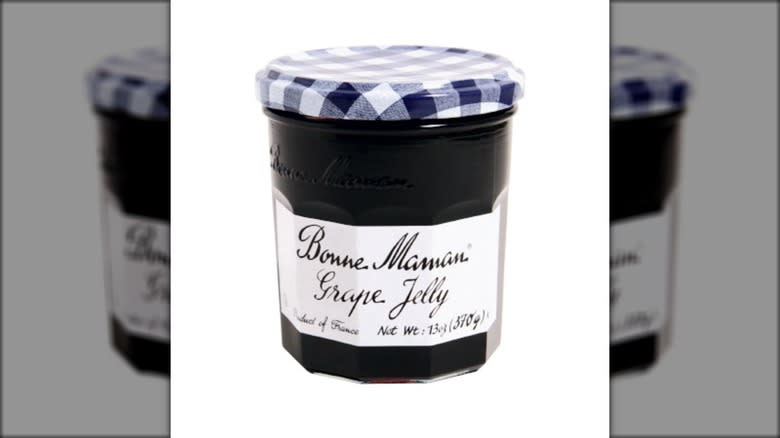
Bonne Maman has managed to solidify itself as the upscale choice for jam lovers. From its iconic gingham lids to the classy handwritten label, the French food brand is a go-to for anyone wanting to add a touch of luxury to their refrigerator. It also has a pretty solid stance on what can and can't go into its products, with its owner -- Andros Foods -- describing its range as being "made with 5 simple ingredients that could be found in your kitchen."
While that's true in the sense that you won't find any high-fructose corn syrup in any of its products, that doesn't necessarily mean that Bonne Maman makes health foods. Its Muscat Grape Jelly uses Muscat grapes, which it claims are naturally sweeter than the Concord grapes used in most jams and jellies. Despite this, it somehow manages to balance it with just as much added sugar -- nine grams, to be precise. That doesn't make it any less delicious; there's a reason why Bonne Maman's products tend to be the jams of choice for chefs and amateur cooks, and that's because everything the company makes tastes like a homegrown drop of fruity heaven. It does, however, mean that you may want to go easy before loading multiple spoonfuls onto your next sandwich.
6. Smucker's Seedless Strawberry Jam
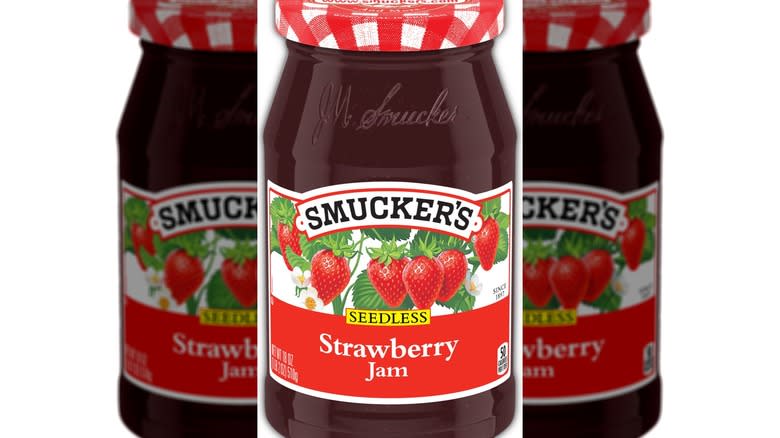
Smucker's is the granddaddy of the jam business and has been jarring and selling its various spreads since 1897. That comes across in the taste of its products, which it describes as "the right balance of fruit and sweetness."
As you may expect, the sweetness in its Seedless Strawberry Jam variety comes from a boatload of added sugars. Every tablespoon serving's nine grams of added sugars will set you back 19% of your daily recommended intake. Yet again, high-fructose corn syrup is the primary culprit, placing second in the jam's ingredients list. As if that's not enough, it also contains two other sources of sugar -- corn syrup and regular old sugar.
The brand has tried to tackle its reliance on sugar in the past. In 1978, it responded to customer complaints about the high sugar content by releasing a product so low in sugar that the FDA actually wouldn't allow it to be sold under the name jam. Those looking for something similar today are in luck, as Smucker's does now sell a sugar-free alternative to America's favorite jam flavor. However, this comes with its own fair share of concerns, such as its use of the flavoring agent Red 40, which has been linked to increased hyperactivity in children and has actually been banned in the United Kingdom and Switzerland due to health concerns.
7. Great Value Peach Preserves
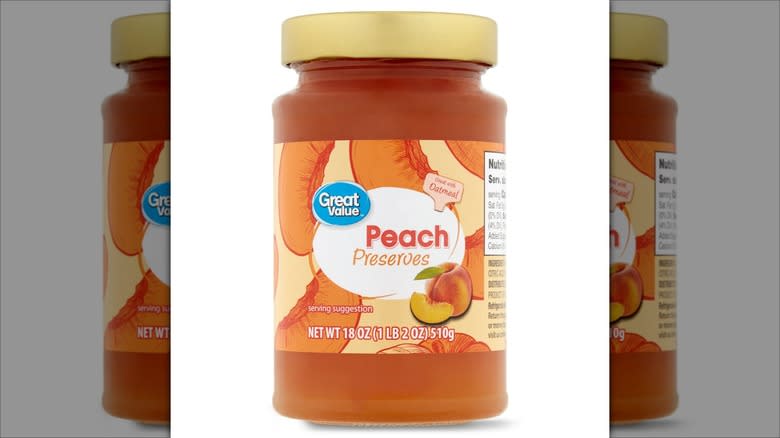
The first ingredient listed on Great Value Peach Preserves is sugar, which tells you everything you need to know. While Walmart proudly describes this spread as tasting more natural due to the use of real peaches, 11 grams of each tablespoon (a tablespoon of jam usually only weighs about 21 grams) is made up of not-so-natural added sugars. If you were to use the more realistic serving of two tablespoons of jam, you'd be blowing nearly half of your daily recommended sugar allowance in a single meal -- and that's before you add in bread, yogurt, oats, or any other food you'd use to serve it.
This time, it's not high-fructose corn syrup that's the issue in the ingredients. Instead, it's the use of glucose-fructose syrup, which has the exact same components as high-fructose corn syrup. As usual, you can also expect to find fruit pectin in every jar.
8. Blackburn's Strawberry Preserves
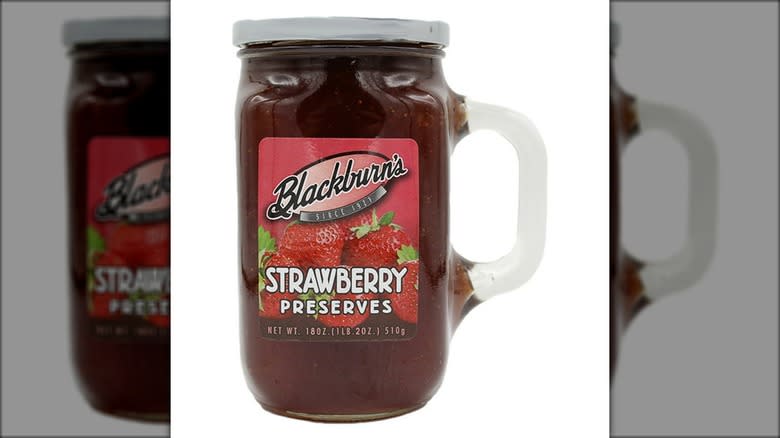
If your number one priority is aesthetic, you'll probably be won over by the iconic handled jars used to contain Blackburn's preserves. Anyone looking for a product low in sugar, however, will be sorely disappointed, as Blackburn's Strawberry Preserves contains 12 grams (nine grams of these are added sugars) in every tablespoon.
This sugar comes from not one but three different sources: corn syrup (the second ingredient listed on the back of each jar), high-fructose corn syrup, and actual sugar. You'll also find pectin nestled into this ingredients list. The same is true of all varieties of Blackburn's preserves -- including the blackberry, apricot, red plum, and grape varieties -- which are equally high in sugar. With all varieties also costing between $10 and $20 at Walmart, there are plenty of alternatives out there that will not only take a lighter toll on your wallet but provide more nutritional value.
9. Welch's Grape Jelly
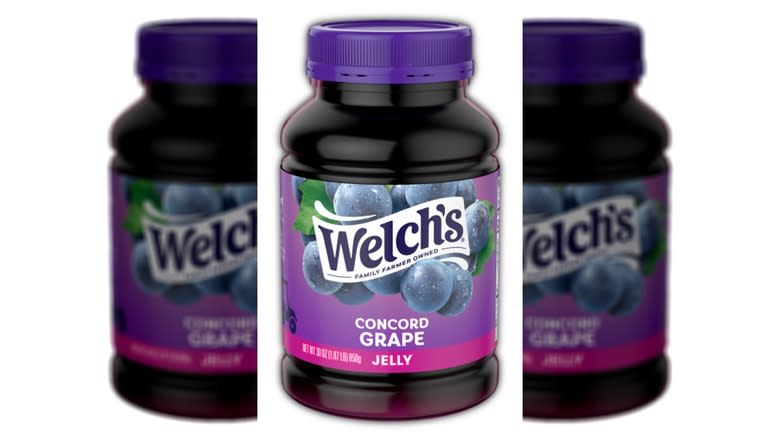
Welch's Grape Jelly is the default for many shoppers building a PB&J. Simple yet delicious, it's a smooth blend that uses 100% American-grown Concord grapes to pack a flavorful punch just as powerful as the brand's iconic 100% Concord Grape Juice and Welch's Fruit snacks.
Unfortunately, this flavorful punch is driven by a hefty amount of sugar. After Concord grapes, the primary ingredients in Welch's Grape Jelly are the typical combo of corn syrup and high-fructose corn syrup. Each tablespoon is weighed down by nine grams of added sugar, which will add up quickly when you start spreading without thinking.
If you're looking for the same familiar Welch's taste for a fraction of the sugar, you may want to consider the brand's Reduced Sugar Concord Grape Jelly instead. This watered-down version of the iconic jelly (literally -- water is one of the main ingredients) ditches the high-fructose corn syrup and instead uses regular sugar, giving it an added sugar total of four grams instead of nine grams.
10. Smucker's Apple Jelly
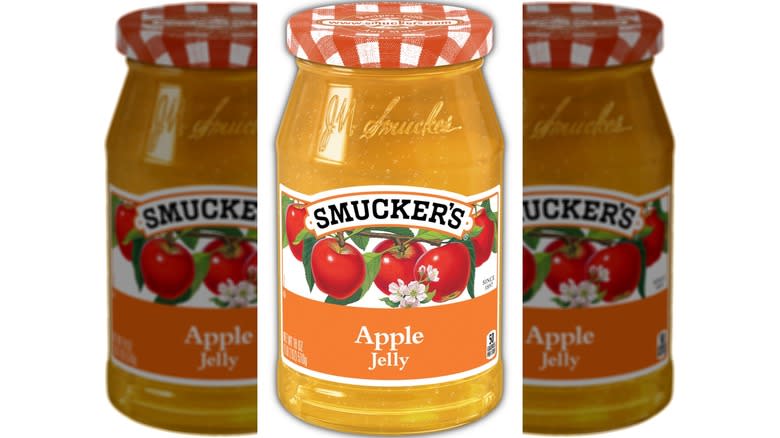
Apple is often left in the dust of more popular jelly flavors such as grape or strawberry, despite the fact it pairs so well with everything from pork to pancakes. As one of the few brands actually retailing the flavor, Smucker's markets its apple jelly as the "perfect way to enjoy crisp apple taste any time of year" -- especially if you blend it with cinnamon, nutmeg, or other fall-inspired notes.
Whatever you choose to do with your apple jelly, you may want to be mindful of combining it with anything else high in sugar. Like other Smucker's jelly flavors, it balances out fruit juice with high-fructose corn syrup and corn syrup -- both of which come with their fair share of health concerns. That helps lessen the tartness of the apple juice but does take its toll on the overall sugar contents of each tablespoon, which sits at 12 grams (including nine grams of added sugar).
11. Midwest Fresh Savory Bacon Jam
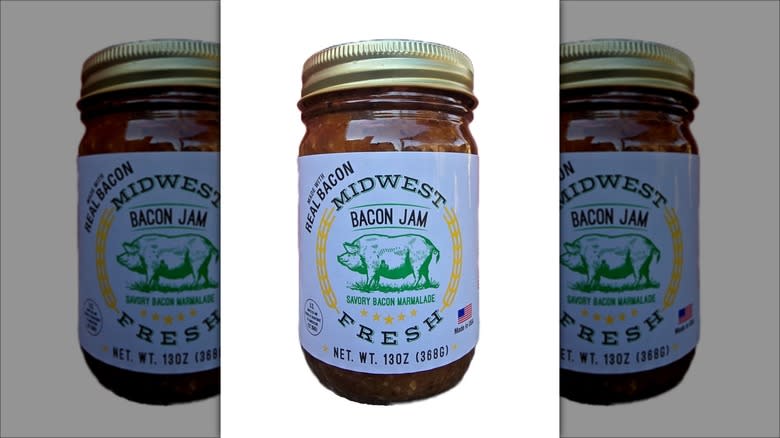
When it comes to jam, fruit isn't always the star of the show. Midwest Fresh is one of multiple brands dabbling in bacon jam, uniting onions, apple cider vinegar, and, of course, smoky bacon to create what was originally intended as a hamburger topping.
Today, Midwest Fresh Savory Bacon Jam is used as a topping or dip for fish, vegetables, and a whole range of off-the-grill meats, as well as a final garnish for a Bloody Mary (if you're so inclined). The blend of smokiness and sweetness makes it taste so good but also sets it back in terms of nutrition. Each two-tablespoon serving is packed with 13 grams of sugar -- all of which is added sugar -- and 280 milligrams of sodium. It's rare for products (especially jams) to disappoint so massively in terms of both sugar and sodium. However, considering that sugar is the very first ingredient listed on the jar and that the jam uses bacon cured in salt, we're not sure we should be surprised.
12. Bonne Maman Cherry Preserves
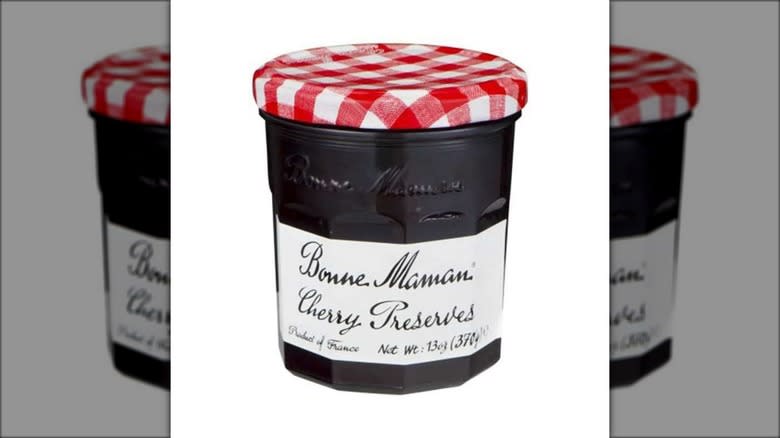
Bonne Maman strikes again -- this time with its Cherry Preserves. Unlike some unhealthier preserves on sale in grocery stores, fruit is No. 1 in the ingredients list, which is a good sign. Each spoonful contains entire chunks of cooked cherry, adding to the impression that this is akin to something you'd whip up in your own kitchen.
Where it disappoints is (yet again) its sugar content. Every 20-gram serving of Bonne Maman Cherry Preserves contains 11 grams of added sugar. That means that over half the weight of every single tablespoon is made up of sugar, which is a fact that's tough to overlook even when you consider its other perks, such as the fact that they are free of high-fructose corn syrup and additives. Like every product on this list, that doesn't mean you shouldn't or can't eat cherry preserves on occasion. But with each tiny spoonful akin to nearly 25% of the maximum amount of added sugar the FDA recommends eating in a day, there are definitely more satisfying ways to consume this much sugar.
Methodology
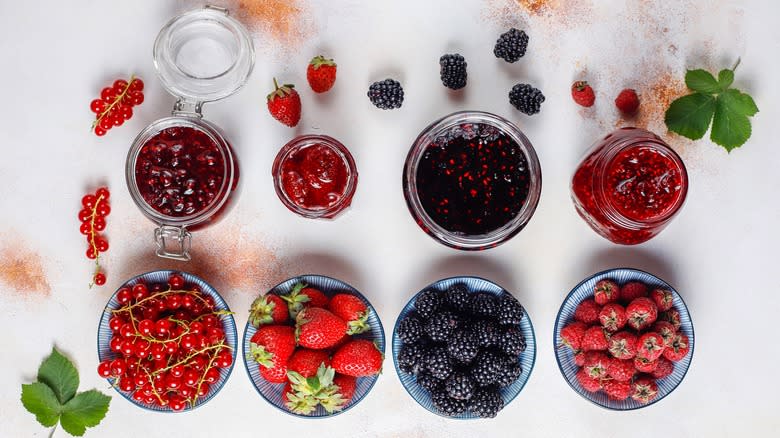
To track down the unhealthiest jams and jellies, we scoured our own pantry and pored over the offerings of multiple major grocery store chains. Once we had compiled a list of both popular and little-known jams and jellies stocked in grocery stores right now, we tracked down each product's nutritional information to compare the calories, sugar, sodium, and fat content to the daily recommended values provided by the FDA.
Jams and jellies being what they are, we knew that sugar content would be our No. 1 priority. We weren't as interested in the total sugar content as we were in the amount of added sugars in each jar. Keeping in mind the FDA's recommended daily limit of 50 grams, we took a close look at products with a high ratio of added sugar to overall weight. The more added sugars there are in a single serving (a serving is generally a tablespoon for jams and jellies), the less nutritional value it holds in your diet.
Aside from the amount of sugar, we were interested in the types of sugar used. Anything containing high-fructose corn syrup or corn syrup was an immediate red flag, considering the amount of criticism both have received from various nutritionists and studies in recent years. We also tracked other controversial ingredients, such as artificial preservatives or dyes.
Read the original article on Mashed

